Vinyl records have long been revered for their unique sound characteristics and warm, nostalgic appeal. As vinyl records age, some enthusiasts argue that they develop a certain charm and sonic richness that enhances the listening experience. In this article, we delve into the intriguing question of whether vinyl sounds better over time. We explore the factors that contribute to the potential improvement of sound quality, the impact of vinyl record maintenance, and the subjective aspects of listener perception. By doing so, we aim to uncover the intriguing relationship between vinyl records and the passage of time.
Vinyl Record Aging Process: Vinyl records are made of a combination of PVC and other additives, resulting in a material that can undergo physical and chemical changes over time. The aging process can potentially lead to alterations in the record’s sonic characteristics, creating a unique sonic fingerprint that distinguishes older records from their newer counterparts.
Vinyl Record Condition and Maintenance: The condition and maintenance of vinyl records play a crucial role in their sound quality over time. Proper storage, regular cleaning, and careful handling can help preserve the integrity of the vinyl and minimize the accumulation of dust, dirt, and scratches. Well-maintained records are more likely to retain their original sound quality and minimize any potential degradation over time.
Groove Wear and Sound Improvement: As vinyl records are played repeatedly, the stylus creates friction on the record’s grooves, resulting in a gradual wearing down of the vinyl. Paradoxically, this wear can lead to an improvement in sound quality. With time and use, the stylus smoothes out imperfections in the grooves, potentially reducing surface noise and increasing overall fidelity. This phenomenon is often referred to as “record burnishing” or “groove polishing.”
Vinyl Record Surface Noise: Surface noise, such as clicks, pops, and crackles, is an inherent characteristic of vinyl records. Over time, the accumulation of dust, dirt, and micro-damage on the record’s surface can increase surface noise, potentially impacting the listening experience. However, some argue that as records age, the sound of surface noise becomes more tolerable and even contributes to the nostalgic charm of vinyl playback.
Vinyl Record Pressing Quality: The quality of the original pressing plays a significant role in determining the longevity and sound quality of a vinyl record. Higher-quality pressings, made with meticulous attention to detail, can withstand the test of time and retain their sonic integrity. Conversely, poorly manufactured records may exhibit more noticeable degradation over time.
Listener Perception and Nostalgia: Listener perception is subjective and influenced by personal preferences and nostalgia. For many vinyl enthusiasts, the aging process of records adds a layer of charm and authenticity to the listening experience. The crackles, pops, and other imperfections that emerge over time evoke a sense of nostalgia and connection to the past. This emotional attachment can lead listeners to perceive older, well-worn records as having a certain magic and enhanced sound quality.
Equipment and System Quality: The playback equipment and system used to listen to vinyl records can significantly impact the perception of sound quality. A high-quality turntable, cartridge, amplifier, and speakers can help reveal the nuances and subtleties present in both older and newer vinyl records. Upgrading equipment or using specialized gear designed to extract the best sound from vinyl can enhance the overall listening experience and potentially amplify any perceived improvements in sound quality over time.
Conclusion: The question of whether vinyl sounds better over time is subjective and multifaceted. While vinyl records can undergo physical and chemical changes that may impact sound quality, proper maintenance and care can help preserve their sonic integrity. The aging process, including groove wear and the accumulation of surface noise, may lead to unique sonic characteristics that some listeners find appealing. Additionally, personal nostalgia and emotional attachment to older records can influence the perception of sound quality. Ultimately, the appreciation of vinyl’s charm and the perceived improvement in sound quality over time is a subjective experience that varies from listener to listener.


